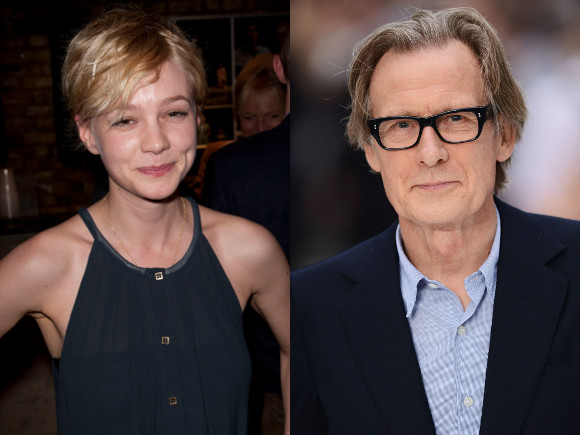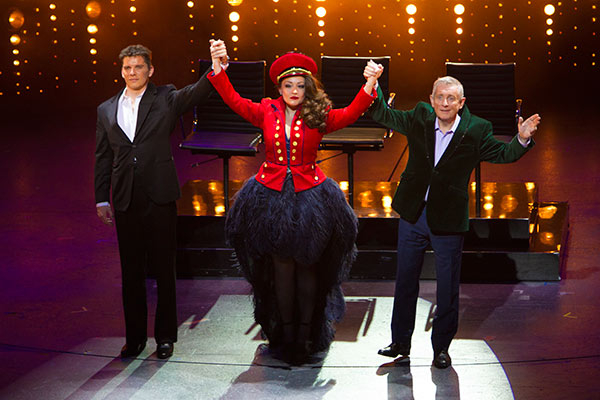Michael Coveney: I Can't Sing about Harry Hill or Mike Leigh, but David Hare's brilliantly off-message
Critics and commentators have been piling into I Can't Sing! at the Palladium, sworn to secrecy until next Thursday morning, though this did not stop critics trading opinions among themselves in the interval on Friday, or Janet Street-Porter describing the show as a modern version of the medieval passion play in the Independent on Saturday.
My lips are sealed, but there's been some last-ditch repair work going on, and some drastic cutting, and it's all a lot less worse than I feared, a sort of very English vaudeville extravaganza, as Janet says, which passed her interval test. If she's fed up with a show, she leaves at the interval, but she told Harry Hill over a half-time beer that she was staying for the second act… which is more than she did at The Book of Mormon.
It will come as no surprise to anyone that the title song is in fact an ironic show-stopper, but the savagery of the send-up, satirical element in the treatment of the toe-curling TV talent show and its perpetrators will be unexpected, perhaps, though the packed Friday night audience of X Factor fans and people for whom Simon Cowell is no doubt some sort of witty style icon, philanthropic cultural arbiter and critical reincarnation of Oscar Wilde seemed to be having a high old time, no worries.
Another major event this weekend I cannot really comment on was an early screening of the latest Mike Leigh movie, Mr Turner, in which Timothy Spall gives a monumental, Charles Laughton-ish performance as the emotionally troubled and repressed 19th century Cockney landscape painter.
Some of the complications in JMW "Billy" Turner's personal life were dealt with by Rebecca Lenkiewicz in her deft, enjoyable play, The Painter, which opened the new Arcola a couple of years ago, with Toby Jones as Turner. What she couldn't do, as film can, was give an idea of exactly how Turner painted – Spall has been studying and painting for two years in preparation – and then give some accurate cinematographic estimation of his revolutionary use of colour, light and sheer brush stroke vigour.
Even in his very first movie, Bleak Moments, Leigh was a master of mood and composition, qualities in his work that tend to get overlooked in the discussions about class and character. Those qualities have deepened with experience and confidence, and I wouldn't be surprised at the end of the year, when the film goes on release, to hear people talking about one of the most beautiful, unsentimentally pictorial British films they've ever seen. It's great about art and critical argument, too, and as culturally, and as carefully, informative as was Leigh's glorious Gilbert and Sullivan movie, Topsy-Turvy.
The new film is, as usual, "written and directed" by Mike Leigh, as was Turks & Caicos on BBC2 last Thursday "written and directed" by Leigh's immediate contemporary, and fellow founding father of London's fringe theatre, David Hare. Turks & Caicos – which are two little luxury tax-haven islands one hour's distance from Miami – is the middle 95-minute film of a Hare trilogy that is as important, and as entertaining (so far), as his great stage trilogy at the National Theatre 20 years ago.
The stage plays – Racing Demon, Murmuring Judges and The Absence of War – formed an anatomical epic triptych of life in the Church of England, the legal profession and the Labour Party. Following on the creation of New Labour, the Blair years and the Iraq War, Ralph Fiennes' briefly glimpsed PM in Turks & Caicos is fingered as not just a politician, but a statesman in waiting, funding his future career in global good works with a cut of the profits in building detention centres and security prisons.
The metaphor is clear, even if the accusation against Tony Blair is slightly ambiguous: statesmen now go around the world making a very good living from writing about and even trying to solve problems they've been responsible for in the first place. The hubris of this would be hilarious if it wasn't so appalling. But this only emerges sideways, as it were, in the film, in which Bill Nighy plays a "retired" MI5 analyst, Johnny Worricker, possessed of a moral mission to understand the world of intrigue and surveillance that he himself has been party to as a professional operator.
It's a brilliant and wonderfully elegant concept, with ultra-cool Nighy in his trademark blue suits and shirts (even the shoes stay on his feet when he paddles through the sea to make a moonlight runner with Helena Bonham Carter to this Thursday's final film) the definitive James Bond of inactive intervention. He never jumps in a car or crawls across the top of a train: he sits by a pool and sips a small beer, or takes a loose-limbed stroll across a holiday hotel compound, and that's it.
The first of the "Johnny Worricker" trilogy, Page Eight, was shown three years ago, and there's a bit of a gap to make up and a few dents in the continuity of story and character – though Fiennes is still the PM, Alec Beasley, and Ewen Bremner still wonderfully sweaty and rat-like as the gay FT journalist and former MI5 colleague of Johnny – but Turks & Caicos had the unbeatable compensation of Christopher Walken as a creepy undercover CIA agent, Curtis Pelissier, and a gloriously restored Winona Ryder as a sort of gangsters' moll, Melanie Fall, going beautifully to pieces as Johnny puts them all together again.
"Whatever happened to shame?" Johnny asks Curtis; "It went the same way as honour," Curtis replies, in a startlingly downbeat exchange on standards in public life. Johnny goes out of his way to soft-peddle his own talent and integrity, but Curtis reckons he's the only figure in all of this who's come out of the "war on terror" smelling of roses.
Helena Bonham Carter, terrific as Johnny's ex-girlfriend, is now caught up with the PM's close friend Stirling Rogers, a private equity entrepreneur, played with a bright-eyed, steely opportunism by Rupert Graves, who organises the Island Colloquium that proves a watershed in the exposure of the international camp-building syndicate. There's also been a murder.
Hare and Nighy are reunited in June on the London stage in Stephen Daldry's Wyndham's Theatre revival of Skylight (with Carey Mulligan as the schoolteacher), the play Hare wrote for Richard Eyre at the National soon after the trilogy.
Michael Gambon played the widowed restaurateur, Tom Sergeant, and Nighy succeeded him in the West End transfer. Second time round, he should have some nice shirts left over from playing Johnny Worricker; the MI5 man's one nod to pampered indulgence is to keep the silky torso-wrappers neatly folded and locked in a safe. No chance of him losing his shirt, any more than Ralph Fiennes' PM will lose any sleep, thinking he's made for life with his dodgy tax deals and US college speaking fees.













